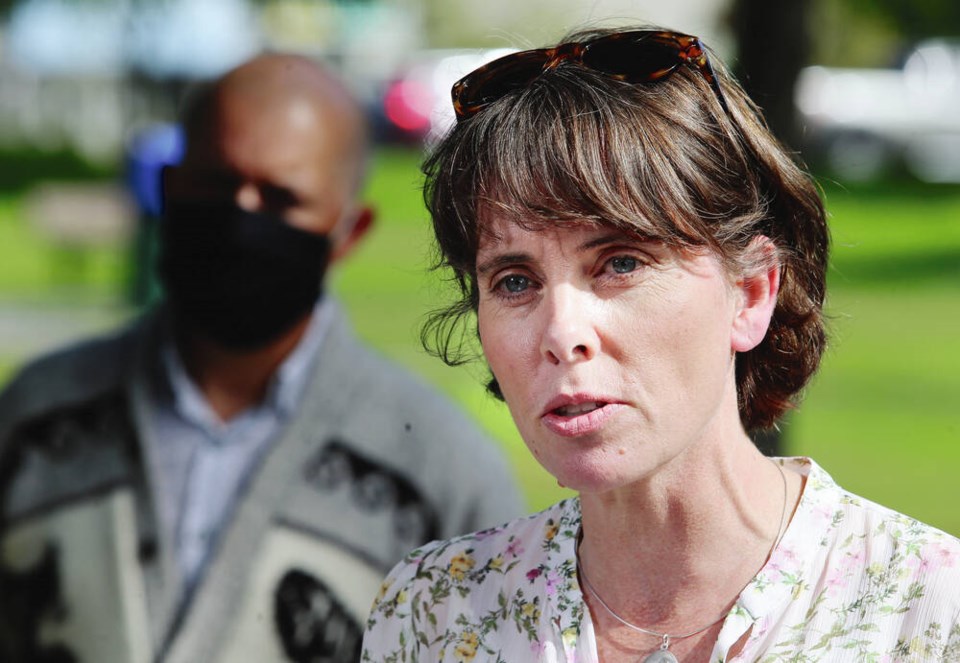Back-to-back closures of emergency rooms on North Vancouver Island last weekend are another example of the overall erosion of the primary care system in rural communities, say the B.C. Green Party and the B.C. Nurses’ Union.
Due to ongoing staffing shortages, the emergency room at Port Hardy Hospital was temporarily closed from 9 a.m. to 7 p.m. on Sunday. At Port McNeill Hospital, the emergency department was closed from 3 p.m. Saturday to 7 a.m Sunday.
Island Health recommended residents make their way to whichever emergency room was open, advising that B.C. Emergency Health Services had protocols in place to make sure ambulances transported patients to an open ER.
The distance between the two communities is about 41 kilometres, and the closest regional hospital ER is in Campbell River, about 2.5 hours away.
B.C. Green Leader Sonia Furstenau and Adam Olsen, MLA for Saanich North and the Islands, who have been conducting a “rural health-care tour,” say the system is facing erosion, and even collapse, due to pandemic burnout, long-standing staffing shortages at hospitals and the inability to attract or keep family physicians in small communities.
While some of those challenges are felt across the province, they hit more acutely in rural communities, Olsen said.
And overcrowding or closures of local ERs and a scarcity of doctors can have a spillover effect at regional hospitals and ERs in communities like Campbell River, Comox Valley and Nanaimo, which are also under pressure, Furstenau said.
“There just seems to be this strain, this increasingly chronic strain, that is now becoming acute on the system,” she said. “The toll it’s taking on nurses is pretty significant.”
Rural residents on Vancouver Island are voicing concerns about local ER closures, long drives to other communities, and the reliability of ambulances, Furstenau said.
“For people, there’s a real worry about being able to access health care when you need it.”
Adriane Gear, vice-president of the B.C. Nurses’ Union, said the increased frequency of temporary ER closures in North Island and ambulance response times reflect a problem that is affecting communities across the province.
Residents of small island communities like Port McNeill and Port Hardy might opt to travel more often to hospitals in larger centres for care, Gear said. “But those hospitals are already at a breaking point.”
And the drive from North Island to Campbell River is via a highway with long stretches without cell service.
“Can you imagine driving your spouse with chest pain for like an hour and a half … with spotty cell service?” she said. “It is absolutely a crisis situation and has an impact on the health of those communities.”
Nurses are spent physically and mentally and can’t be asked to do more after two-plus years of a pandemic, Gear said, adding COVID-19 patient numbers at hospitals are on the rise right now.
“It’s very distressing working at a facility and knowing it’s going to have to close because you’re going to take your first vacation in two or three years,” Gear said. “Or because you’ve contracted COVID and can’t go into work.”
Island Health has relied on shifting nurses to plug staffing gaps at the last minute, Gear said, which means nurses are sometimes in areas they might not be qualified to work in.
The health authority is also relying increasingly on private agency contract nurses, Gear said. She said the help is welcome, but contract nurses can’t be redeployed and they also may not be familiar with the facility they are working in.
No one was available from Island Health to speak with a reporter.
However, it said in a statement that staffing shortages due to COVID-19 are impacting the health authority and other regions of the province.
“This can cause shortages which are particularly challenging in rural and remote communities and within small sites or programs,” the email said, adding that sometimes, one staff member calling in sick can affect minimum staff levels necessary for patient safety.
There hasn’t been a situation where both local ERs north of Campbell River have been closed at the same time and no patients were diverted south of Port Hardy or Port McNeill due to the weekend closures, Island Health said.
It also said the temporary closures of the North Island ERs are not impacting regional hospital ERs in Campbell River, North Island or Nanaimo.
It did not clarify whether it expects further ER closures in North Island.
Port McNeill Mayor Gaby Wickstrom said in an email that the emergency room closures have residents in her community concerned.
“We are actively working with Island Health to brainstorm recruitment and retention solutions,” Wickstrom said.
“Island Health has been open with us that this issue will not be solved overnight, and we will have to navigate through the shortages over the summer.”



